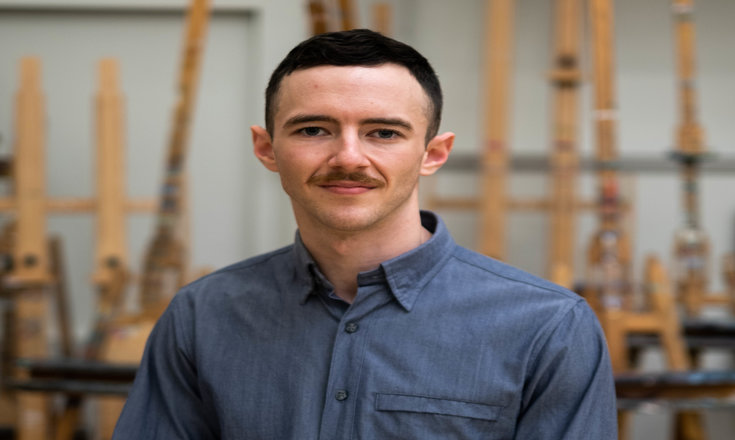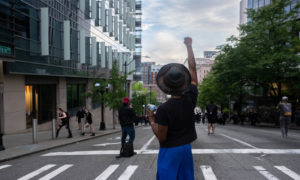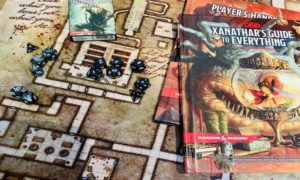It was deep in the night at our remote outpost and the cold wind cutting across the Kandahar Desert chilled me to the bone as I put on my armored vest and made my way to my guard post. The vest dug into my shoulders as I walked, my boots trudging through the loose sand as I tried to balance myself, groggy from the early start to my day and struggling to keep my eyes open. Who else would be awake at this terrible hour, and what would their intentions be? I thought of the possibilities, of looking out from my post and seeing flashlights illuminating the dark at a distance, getting closer as they danced back and forth. Would I be able to react? Would I have time to shoulder my rifle and identify them before they were too close and it was too late? Damnit, I had to. I had no intentions of dying in this desert, so far from home, just because I wanted a few more minutes of rest. Why was I so tired if my mind was so active? My body was exhausted in it’s sleep deprived state, but my senses were heightened from the fear of the unknown bearing down upon me. Could I use this fear positively, to prepare myself for these possible threats? Yes. I had to. My own life and the lives of my fellow soldiers depended on it. I straightened my back, facing that cold desert wind and watched outward, waiting for anything that might signal danger coming from the strange dark landscape before me.
That night, like most before it, was uneventful. Trucks filled with late night deliveries moved along the far off highways, their headlights tracing along the distant roads and disappearing into the village streets. Livestock cast their familiar shaped glow in my thermal imaging device. Local farmers, awake by dawn, came outside to walk their fields and check their crops. They would wave to me as they came into my view, making sure that I could see them as they went about their business. “I’m over here, I have nothing to hide” they would signal. My relief would arrive shortly and take over my watch. I would brief them on everything I saw that night and point out the farmers locations in the fields, ensuring that my fellow soldiers would not become surprised if they saw several heads popping up from the rows of dirt that made up the irrigation ditches. I would then make my way to the mess hall where breakfast was being served so that I would not have to sleep on an empty stomach.
While there, eating powdered eggs and frozen breakfast sausage, I would chat with the other members of my watch shift as the watered down instant coffee warmed my stomach. It was several months into our tour and conversation topics had gone stale. There was little to discuss except for work. So we discussed work. We talked about our shifts, the things we saw during the night. The graveyard shift we worked was particularly anxiety inducing, as it was common practice for enemy fighters to attack at dawn, when the light first came up and they knew that two thirds of us still slept.
“I fell asleep last night,” said a Private First Class. “I woke up to the radio going off in my ear thinking ‘Oh god, we’re getting overrun’, and I jumped onto the machine gun, but it was just another post asking for more water!”
We all thought that was funny. We could, since nothing had happened when this young soldier had fallen asleep. Had we been attacked, it would not have been so humorous.
“I was so tired last night I think I was hearing voices,” said another young soldier. “I swear I heard someone having a conversation right behind me. I jumped up and looked busy thinking the Platoon Sergeant was giving a surprise inspection.”
Specialist H, a veteran with a few previous tours of Afghanistan behind him, decided to chime in. “It could have been ghosts,” he said.
He suddenly had the attention of the table. Some of us chuckled while a few cast looks of disbelief, but we all wanted to hear more. When pressed on why he said that, Specialist H began to tell us of his first tour many years ago, while most of us were still in high school. He told us of his old firebase, deep in the Hindu Kush mountains, far to the north of the country. The base was built on a rocky mountainside, overlooking a valley of strategic importance for both sides. It was not the first time an outpost had been put there, however. In the 1980’s, invading forces from the Soviet Union noticed the tactical value of this particular site as well. So they stationed a unit to overlook the same valley.
The mission of this unit was unsuccessful. The local forces fighting the Soviet invasion, Mujahideen as they would call themselves, launched a daring attack on the entrenched Soviet forces. They scaled the mountain and began their assault. They used rockets and mortars first, trying to destroy the watchtowers and machine gun nests that surrounded the base. After the initial destruction, waves of fighters ran into the base through openings in the barbed wire created by the blasts. They made their way through, killing all the defenders in a violent bloodbath on that rocky mountainside. The bodies of those slain Russians never made it home. They were buried under their own base in mass graves, bodies piled on top of each other and covered with sand, left to decompose.
The corpses stayed under the sand and the rocks, even several decades later when American forces first set foot onto that mountain and began to fortify it as well. Specialist H continued to tell the story, now having the full attention of the table as we all stared at him like children listening to scary stories around a campfire. He told us about the strange things the soldiers there experienced while on guard. Sentries in the machine gun nests heard whispering at night, words in Russian from the graves that lay just beneath their feet. Soldiers walking around at night would see men walking around in the darkness, just beyond the limits of their night vision devices. When the soldiers would challenge them, flicking on flashlights to illuminate them, they would find themselves alone, no sign of any intruders or fellow night owls.
I finished my breakfast and went to my cot to sleep, but all I thought of was the story I had just been told. Were those ghostly soldiers real? Could they have been imagined? Sleep deprivation does strange things to your mind, and it is fairly common for an exhausted brain to conjure visions and sounds that aren’t actually there, especially with the heightened senses and uneasiness that go hand in hand with living in a combat zone. Michael Shermer, editor of Skeptic magazine, gave a TED Talk about this phenomenon. In his talk, Shermer says “that people that are alone and fatigued, tired, sleep deprived, hungry…, these people all report somebody with them that they talk to.” Shermer describes hallucinations experienced by solitary people in stressful environments and situations.
Shermer also introduces the work of a Canadian researcher, Michael Persinger, who created a device to create these hallucinations. Persinger calls his invention the “God Helmet.” It consists of a safety helmet fitted with electrodes to stimulate the temporal lobe of the brain. When this lobe is overstimulated the brain creates imaginary figures like goblins, elves, or even angels. By creating these figments, the brain projects “vessels” that offer support, or company, to individuals suffering from sleep deprivation or extreme solitude.
The existence of ghosts is unlikely. And researchers like Michael Persinger think the human brain creates ghosts while it’s under duress. But what if something else causes people to see apparitions of the dead?
Locations have stories attached to them. Stories passed down by generations of listeners. Perhaps ghosts appear because they embody the fears of the listeners. Maybe the ghosts that my fellow soldiers saw in the mountains were not manifestations of the dead or spirits from beyond the grave so much as they were projections of fellow soldiers. They had been in the same place for the same reasons as us, and they had suffered greatly as a result. We had a lot in common with the dead. They were far from home, sent by men they had never met, for political reasons that they would have had no part in otherwise. We feared the fate that had befallen them, overpowered and killed on the side of a cold, rocky mountain. The ghosts served as reminders, figments to remind us of the danger we lived in and to keep our heads on a swivel.
The next few nights, as I again walked to my post through the cold darkness I was reminded of that firebase deep in the northern mountains, built atop the graves of its defenders. If you forget about the danger around you, the wrong mistake at the wrong time can give an advantage to those that would do you harm, those that could be waiting just out of sight, waiting for the time to press their advantage and turn yet another outpost into a sand-covered graveyard.






Comments are closed.